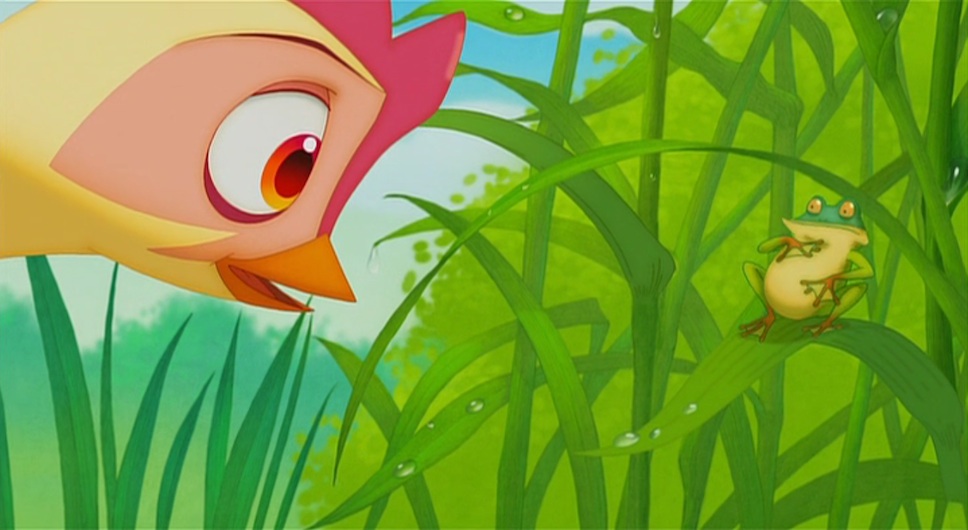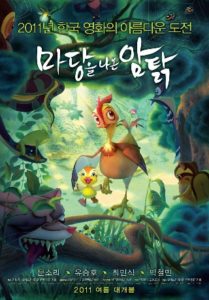A charming piece of animation from South Korea has a broad appeal with its depiction of motherhood and respecting differences in others.
Director: Oh Sung-yoon
Writer(s): Na Hyun, Kim Eun-jung
Runtime: 93 minutes
Starring: Moon So-ri, Yoo Seung-ho, Choi Min-shik
Festival: Korean Film Festival in Australia 2012
Country: South Korea
Rating (?): Better Than Average Bear (★★★½)
Leafie, A Hen Into the Wild was already a popular character in its native Korea before ever appearing on-screen, being based on the popular 2000 children’s book by Hwang Sun-mi. However, the fact that it had sold over 1 million copies domestically and had been translated into several languages was not a guarantee of box-office success. Indeed, despite many of the major US animation companies using small animation house in South Korea to work on their products, local animation has often struggled to find an audience within its own market, very rarely crossing one million audience members at the box-office. This changed with last year’s Leafie, A Hen Into the Wild, which became the biggest domestic animation success in Korea with an impressive 2.2 million viewers.
Leafie (voiced by the award-winning Moon So-ri) is a cage hen who dreams of visiting the yard, and one day of laying eggs and raising some hatchlings of her own. Leafie manages to escape, and soon finds herself in the big wide world, chased by a vicious one-eyed weasel. Defended by a mallard duck she dubs Wanderer, Leafie is ultimately left to care for an egg until it hatches. Despite the child being a duck, it things she is his mother, and she cares for the baby duck she calls Greenie as though it was her own. As Greenie grows up, he and all the other animals begin to resent Leafie for being so different from the others, and Greenie is left out of activities by the pond because of it. However, when a flock of wild ducks arrives, Greenie must choose between the love of his adopted mother and his destiny.
The tale of struggle behind the production of the film is almost as epic as Leafie’s own story arc. Debut director Oh Sung-yoon worked for 20 years as an animator despite the harsh swings and roundabouts of the Korean economy, and production company Myung Films spent six years in various stages of production to bring this labour of love to the screen. The care is immediately evident, with a visual style that stands apart from anything that its international competitors are offering. In stark contrast to the 3D computer generated animation of the Hollywood productions, Leafie, A Hen Into the Wild relies on a much simpler palette and animation style. The art team’s background was in painting, and as such the entire film has a beautiful watercolour look to it, mirroring the storybook quality of the source material. At other times, the skylines are stunning, belying the 3 billion won ($2.5 million) budget. The choice of voice talent is also quite clever, and aside from Moon So-ri in the lead role, the enigmatic Wanderer is the usually sinister screen presence of Choi Min-shik (Oldboy, I Saw the Devil).
The central narrative of Leafie, A Hen Into the Wild is base don the same sense of simplistic morality as most children’s tales, although it goes to some very dark places at the very beginning and in the final scenes that take a turn for the unexpected. The sometimes repetitive nature of the tale will occasionally lessen the impact for older audiences, as the familiar bonding moments of mother and son eventually give way to chase sequences and face-offs with other animals. Yet at its heart, it is a simple story of motherhood, and tolerance to diversity, and one that almost everybody can relate to. Korean animation has been pushed out of the nest, and let’s hope it is a strong flyer from now on.
Leafie, A Hen Into the Wild played at the Korean Film Festival in Australia in August/September 2012. Full disclosure: The Reel Bits is a media partner of KOFFIA, but opinions on films are unswayed by this relationship.






